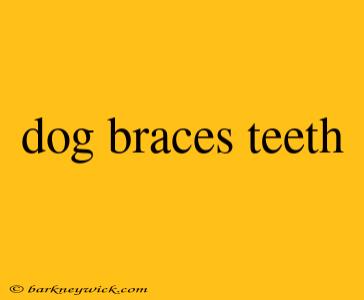Dog Braces: A Tail of Tooth Trouble and Triumph
Have you ever wondered if your furry friend needs braces? It might sound like a strange concept, but just like humans, dogs can experience dental issues that require specialized care. I remember when my Golden Retriever, Buddy, started struggling to eat his favorite chew toys. I assumed it was just old age, but a trip to the vet revealed a different story – his teeth were misaligned, making chewing difficult. It was then that I learned about the world of dog braces.
The Reality of Dog Braces
While braces might seem like a human thing, they are a real solution for dogs facing dental issues. In my opinion, it's a testament to the progress in veterinary medicine that we can now address these problems for our beloved companions. But just like any medical procedure, it's important to approach dog braces with caution and a good understanding of the process.
What Are Dog Braces?
Dog braces, formally known as dental appliances, are custom-made devices designed to correct misaligned teeth. They are often made of stainless steel or titanium and are bonded to the teeth using a special adhesive. The process can be similar to human braces, with adjustments being made over time to slowly shift the teeth into proper alignment.
Why Would My Dog Need Braces?
Several factors can lead to the need for dog braces. Malocclusion, or an improper bite, is a common reason. Other factors include overcrowding, trauma, or genetics.
According to the American Veterinary Dental Society (AVDS), malocclusion affects around 10% of dogs and can lead to various problems including:
- Difficulty chewing and eating
- Tooth wear and damage
- Gum disease
- Jaw pain
- Chronic infections
Who Can Benefit from Dog Braces?
While not every dog will need braces, they can be a valuable option for those struggling with dental issues. Breeds like Bulldogs, Pugs, and Shih Tzus are predisposed to malocclusion due to their facial structure. However, any dog can benefit from proper dental care and might require braces if necessary.
Making the Decision
If your dog is experiencing dental problems, a veterinarian specializing in veterinary dentistry is the best resource. They will perform a thorough examination and recommend the best treatment plan for your dog. This might include braces, but it could also involve other options like tooth extractions, dental cleaning, or corrective surgery.
Tips for Dog Brace Care
- Follow your vet's instructions for cleaning and maintaining the braces.
- Monitor your dog for any signs of discomfort or irritation.
- Provide a soft diet during the adjustment period.
- Regularly check for loose or broken brackets.
- Maintain a good dental hygiene routine with daily brushing and regular professional cleanings.
The Joy of a Healthy Smile
Seeing Buddy happily chew his favorite toys again after his braces was truly rewarding. It reminded me that even the smallest things can make a big difference in our furry companions' lives. Dog braces are a powerful tool for improving dental health and overall well-being, offering a brighter future for our canine friends.
